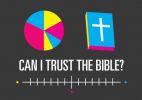What is the Apocrypha?
Should we be reading the Apocrypha like we read the Bible?
It's not the Old Testament or the New Testament
During the 400 years of silence between the end of the Old Testament and the coming of Jesus, may other works were written, including books of history, fiction, practical living, and 'end-times' speculations. These books are also known as the apocrypha, which means “hidden” or “secret” because the religious leaders of that time preferred that the books not be widely read by the people.
While these books were read by some of God’s people, they were treated more like popular Christian books (e.g. something you might buy at a Christian bookstore), but they were never accepted as Scripture for many reasons.
Why the Apocrypha is not in the Bible
1) Many of the apocryphal books were pseudepigraphal, meaning that they were written under a false name so that the true identity of the author would be unknown. These 'pen names' were often those of Biblical people (e.g., Enoch, Abraham, Moses and Solomon), deceitfully leading readers to believe the books were written by these Biblical men.
2) While the Old Testament is quoted some 300 times in the New Testament, none of the apocryphal books are ever quoted in the New Testament or even alluded to, (with the exception of a much debated section of Jude), showing that none of the New Testament writers seemed to consider the Apocrypha as scripture.
3) Both Jews and Christians rejected any of the apocryphal books as divinely inspired sacred Scripture. However, that changed for some at the Council of Trent in 1546. At that time, the Catholic Church was facing a growing protest movement (now known as the Protestants) that denounced some of the church's teaching as unbiblical. Among the chief critics was the Catholic monk, Martin Luther, who pointed out that praying to saints, paying indulgences to the church, and purgatory were not found in the Bible. In an effort to defend themselves, the Catholic church voted to insert new books into the Bible, more than a millennium after the Old Testament had been completed and the apocryphal books had been rejected as Scripture. Why? Because it found some support for its unbiblical doctrines in the apocrypha and, rather than changing its doctrines, it instead chose to change its Bible. Subsequently, if you open Catholic Bibles today, you will find books with names such as Tobit, Judith, the Wisdom of Solomon, Ecclesiasticus or the Wisdom of Jesus ben Sirach, Baruch, 1 & 2 Maccabees, as well as additions to Esther and the book of Daniel.






